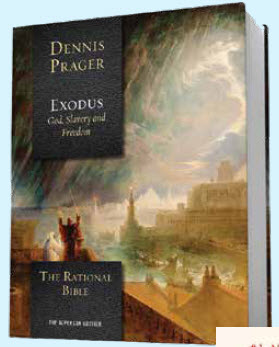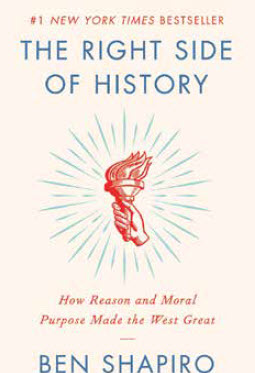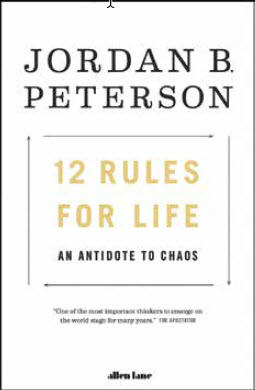Four Books To Start Your New Year
 By: Rosemary Dewar
By: Rosemary Dewar
Over the past year I have had the pleasure of reading my heart out. I specifically focused on non-fictional analysis and Biblical commentary that strengthened my critical thinking capabilities concerning the Judeo-Christian basis for American thought. The moral origin for ‘how’ and ‘why’ the Founding Fathers came to the conclusions they did were largely the result of a deep understanding of history and Biblical rationality. Now, how these rationales can be used to solidify an individual’s identity with the Judeo-Christian framework will be explained in the last book I will present to you.

Let us start at the very beginning. Radio personality and political commentator Dennis Prager began what he is considering his “magnum opus.” Mr. Prager has started on a journey of completing a full commentary of the first five book of the Bible (The Torah), and titled it, The Rational Bible. Dennis decided to release his work regarding the book of Exodus first. His justification was that the law given to the nation of Israel is originally housed here, and it would serve as a foundational explanation of the nature of God for the rest of the commentary. Mr. Prager goes verse by verse to expound on the historical and modern application of the each citation. He also includes essays where he can interject his experiences and additional knowledge concerning a particular subject in the text. Genesis was published second. It serves as an introduction to the approach God took to reveal Himself to mankind, and how God shaped a nation with flawed devotees. Dennis reiterates the authenticity and reason throughout the text due to the unabashed showcasing of weaknesses and divine discipline presented within each story. Both books are highly recommended, and I am anxiously awaiting the release of the other three volumes. The Rational Bible is an engaging, thought-provoking, and streamlined observation of Jewish belief and ancient expressions of morality and reason.

Next, I suggest that you read political commentator Ben Shapiro’s The Right Side of History: How Reason and Moral Purpose Made the West Great. Mr. Shapiro also has considered this book as one of, if not the best works he has written. Ben builds a case for the need to understand and fulfill one’s purpose in order to connect with our neighbors while also partnering with those you many disagree with to maintain a healthy community. He journeys through the greatest thinkers: Aristotle, Plato, Socrates, Cicero, Maimonides, and Thomas Aquinas to explain the relationship between Athens and Jerusalem. When addressing scientific advancement, Shapiro asserts how the growth of Christianity was more instrumental in the progress of scientific discoveries than it was a hindrance to it. Ben goes on to explain the building blocks of Western styles of government by presenting a summary of the debate between John Locke and Thomas Hobbs. Within this analysis, the value of mankind and unapologetic foundation of the unmoved Creator are the mainstays for the framework the founding fathers used to develop the United States. Furthermore, it gives a call to hold fast to these foundations when pressing forward in bringing those with conflicting viewpoints back together.

Lastly, Psychologist Jordan B. Peterson’s Twelve Rules for Life: An Antidote to Chaos is a distillation of an answer Jordan gave to a question posted on the social media platform Quora that asked, “What are the most valuable things everyone should know?” His post consisted of forty-two provisos that one would think would be pretty standard lessons learned in life, but Professor Peterson was finding that many of these lessons were not being taught culturally or socially. To his surprise, practically no one was talking about these simple lessons the way he was. These requisites seem provincially simple. As our culture continues its attempt to tear down some fundamental human proverbs, his work simply re-asserts them. The bedrock of our psyche has a history and a purpose, and Peterson’s book re-examines those aspects. Each chapter fuses literature, history, science, modern entertainment, and religious consciousness to build a coherent philosophical picture of the forms chaos can take in one’s life (specifically when that chaos is you), and how to overcome yourself.
These four books have allowed me to organize my thoughts and beliefs in a way that address the many facets that have influenced me. If you are looking to explore the depths of ‘why’ you may think the way you do, and learn classical humanities which have been rigorously attacked by modern academia for the last two decades, you need look no further.
By: Rosemary Dewar